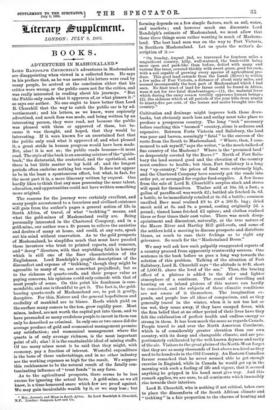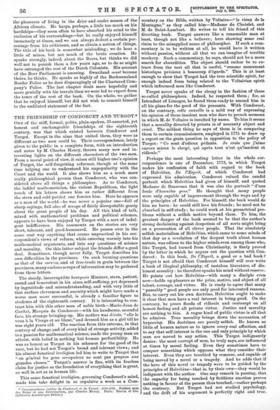BOOKS.
ADVENTURES IN MASHONALAND.* LORD RANDOLPH CHURCHILL'S adventures in Mashonaland are disappointing when viewed in a collected form. He says in his preface that, as he was assured his letters were read by many people, he arrived at the conclusion either that his critics were wrong, or the public cares not for the critics, and was really interested in reading about his journeys. "But the Public only reads what it approves of, or what pleases it :" so says our author. No one ought to know better than Lord R. Churchill that the way to catch the public ear is by ad- vertisement; and his letters, as we know, were copiously advertised, and much fuss was made, and being written by an interesting person, they were read, not because the public was pleased with them or approved of them, but be- cause it was thought, and hoped, that they would be interesting. If it were known for an ascertained fact that the public only read what it approved of, and what pleased it, a great stride in human progress would have been made. But, alas! it is not so; the public reads because—it must read. The style of the book is an amusing mixture of the "guide- book," the dictatorial, the oratorical, and the egotistical, and there is but little matter to lay hold of; and the longest periods often enshrine nothing but words. It does not appear to be in the least a spontaneous effort, but what, in fact, for the most part it is, a mere itinerary written by request. One hardly likes to think that any man possessing the same talent, education, and opportunities could not have written something more original.
The reasons for the journey were certainly excellent, and many people accustomed to a luxurious and civilised existence will gain from the author's pages a general notion of life in South Africa, of travel, of what " trekking " means, and what the gold-mines of Mashonaland really are. Being personally interested in the Chartered Company, and in a gold-mine, our author was a fit person to relieve the anxieties and doubts of many at home, and could, at any rate, speak out his mind without reservation. As to the gold prospects of Mashonaland, he simplifies much that must have puzzled those investors who trust to printed reports, and rumours, and" decoy" directors, with that unyielding faith in honesty which is still one of the finer characteristics of the Englishman. Lord Randolph's graphic descriptions of the discomfort and expense of "trekking," though they might be agreeable to many of us, are somewhat prejudiced; but as to the richness of quartz-reefs, and their proper value as paying concerns, his opinions could only coincide with that of most people of sense. On this point his frankness is com- mendable, and one is thankful to get it. The fact is, the gold. bearingquartz-reefs of Mashonaland are, to put it gently, deceptive. For this, Nature and the general hopefulness and credulity of mankind are to blame. Reefs which yield on the surface many ounces to the ton, grow rapidly poor. Most mines, indeed, are not worth the capital put into them, and to have persuaded so many credulous people to invest in them can only be described as criminal. In only one or two cases did the average produce of gold and economical management promise any satisfaction; and economical management where the quartz is of only average richness, is the most important point of all; alas ! it is the unattainable ideal of mining staffs. Of too many mines must it be said that they might, with economy, pay a fraction of interest. Wasteful expenditure is the bane of these undertakings, and in no other industry are the working expenses so high for the result. We suppose this recklessness to be the natural result of the fatally con- taminating influence of "trust funds" in any form.
As to the agricultural prospects, there seems to be less excuse for ignoring the actual facts. A gold-mine, as we all know, is a time-honoured snare which few are proof against. We may gain incalculable wealth by it, or we may lose ; but
• Men, Animalr, and Mines in South Africa. By Lord Randolph S. Churchill, M.P. London: Sampson Low and Co.
farming depends on a few simple factors, such as soil, water, and markets ; and however much one discounts Lord Randolph's estimate of Mashonaland, we must allow that these three things seem rather wanting in mach of Mashona- land. The best land seen was on the way to Port Victoria, in Southern Mashonaland. Let us quote the writer's de- scription of it :—
" On Sunday, August 2nd, we traversed for fourteen miles a magnificent country, hilly, well-watered, the bush-veldt being more open and park-like than before, dotted with many and various fine trees, covered thickly with sweet grass, good for oxen, with a soil capable of growing every species of agricultural pro- duce. This good land extends from the Lundi (River) to within a few miles of Port Victoria, a distance of about sixty miles, and seemed incomparably the best part of Mashonaland which I had seen. No finer tract of land for farms could be found in Africa, were it not for two fatal disadvantages,—(1), the malarial fever which during the rainy season terribly oppresses human beings ; (2), the sickness which at all periods of the year kills from ninety to ninety-five per cent. of the horses and mules brought into the country."
Cultivation and drainage might improve both these draw- backs, but obviously much loss and outlay must take place to produce a prosperous country. The long " trek " necessary before reaching this " boomed " country, alone is arduous and expensive. Between Forts Victoria and Salisbury, the land was poor and barren, seemingly " fatal " to the success of the route from the South to Mashonaland. "Where, then, I com- menced to ask myself," says the writer, "is the much-talked-of fine country of the Mashona P Where is the promised land' so desperately coveted by the Boers " North of Fort Salis- bury the land seemed good and the elevation of the country must conduce to health ; but then, Fort Salisbury is a long way "up-country," the prices of food were extremely high, and the Chartered Company have scarcely got the roads into order yet, or arranged for regular food-supplies. A few items from the sale of Lord R. Churchill's surplus stock and stores
will speak for themselves. Timber sold at 16s. 3d. a foot; a gallon of paraffin-oil was worth £2; bottled ale fetched 3s. 6d. a bottle, to be immediately retailed at 6s. 6d. a bottle; common unsifted Boer meal realised £8 to 29 a 200 lb. bag ; dried snook sold at 8s. and 9s. a pound, costing originally 2d. a
pound ; tinned hams fetched E2 apiece; and clothes realised three or four times their cost value. There was much disap- apointment and discontent, naturally, at the true nature of the Mazoe River and Hartley Hill gold-reefs, and some of the settlers held a meeting to discuss prospects and distribute blame, as much to ease their feelings as to right any grievance. So much for the "Mashonaland Boom."
We may well ask how such palpably exaggerated reports of a country proceed from apparently trustworthy sources. One sentence in the book before us goes a long way towards the solution of this problem. Talking of the situation of Fort
Salisbury, Lord R. Churchill says "the altitude is 40 ft. short of 5,000 ft. above the level of the sea." Thus, the bracing effect of a plateau is added to the drier and lighter
atmosphere of a continent. The result of travelling and hunting on an inland plateau of this nature can hardly be conceived, and the subjects of these climatic conditions are not aware of it themselves. The imagination ex- pands, and people lose all ideas of comparison, and as they generally travel in the winter, when it is not too hot or too wet, they come away, if they have escaped fever, with the firm belief that at no other period of their lives have they felt the exhilaration of perfect health and endless energy so strong in them. It has been much the same as regards Canada.
People travel to and over the North American Continent, which is of considerably greater elevation than our own country, with its damp and changeable climate, and are pro- portionately exhilarated by the well-known dryness and rarity of the air. Visitors to the great plains of the North-West forget that they are as many thousands of feet above sea-level as they used to be hundreds in the Old Country. An Eastern Canadian farmer remarked that he never seemed able to get enough exercise in England, while in Canada he would get up in the morning with such a feeling of life and vigour, that it seemed anything he gripped in his hand must give way. And this remark applies, we are sure, to all continents which insensibly rise towards their interiors.
Lord R. Churchill, who is nothing if not critical, takes care to place the discomforts of the South African climate and " trekking " in a fair proportion to the charms of hunting and
the pleasures of living in the drier and cooler season of the African climate. He harps, perhaps, a little too much on his hardships—they seem often to have absorbed his mind to the exclusion of his surroundings—but he really enjoyed himself immensely at times, and we can always deduct a certain per- centage from his criticisms, and so obtain a notion of things. The title of his book is somewhat misleading; we do hear a little of mines, but not much of the brute creation. He speaks strongly, indeed, about the Boers, but thinks we did well not to punish them a few years ago, as to do so might have estranged the rest of the Dutch Colonists. His account of the Boer Parliament is amusing. Swaziland must become theirs, he thinks. He speaks as highly of the Bechuanaland Border Police as he does disparagingly of the Chartered Com- pany's Police. The last chapter deals more hopefully and more genially with his travels than we were led to expect from the tenor of the rest of the book. On the whole, we gather that he enjoyed himself, but did not wish to commit himself to the undiluted statement of the fact.



















































 Previous page
Previous page